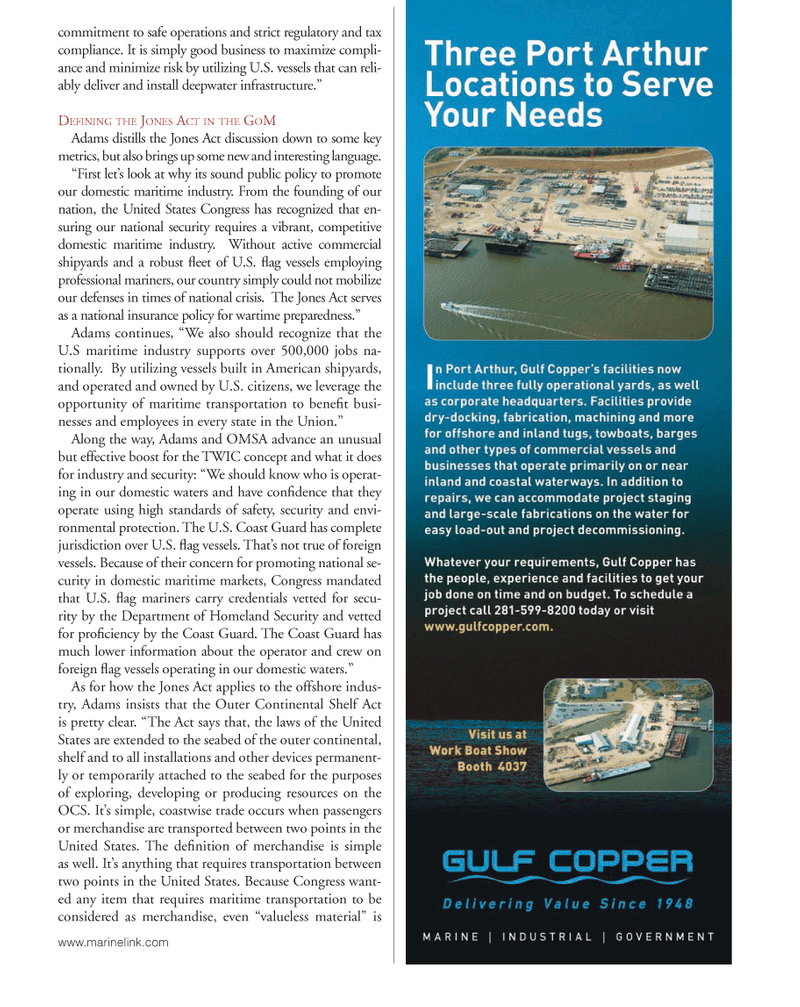
Page 49: of Marine News Magazine (September 2013)
Workboat Annual
Read this page in Pdf, Flash or Html5 edition of September 2013 Marine News Magazine
commitment to safe operations and strict regulatory and tax compliance. It is simply good business to maximize compli- ance and minimize risk by utilizing U.S. vessels that can reli- ably deliver and install deepwater infrastructure.? DEFINING THE JONES ACT IN THE GOM Adams distills the Jones Act discussion down to some key metrics, but also brings up some new and interesting language. First lets look at why its sound public policy to promote our domestic maritime industry. From the founding of our nation, the United States Congress has recognized that en- suring our national security requires a vibrant, competitive domestic maritime industry. Without active commercial shipyards and a robust ? eet of U.S. ? ag vessels employing professional mariners, our country simply could not mobilize our defenses in times of national crisis. The Jones Act serves as a national insurance policy for wartime preparedness.? Adams continues, We also should recognize that the U.S maritime industry supports over 500,000 jobs na- tionally. By utilizing vessels built in American shipyards, and operated and owned by U.S. citizens, we leverage the opportunity of maritime transportation to bene? t busi- nesses and employees in every state in the Union.? Along the way, Adams and OMSA advance an unusual but effective boost for the TWIC concept and what it does for industry and security: We should know who is operat- ing in our domestic waters and have con? dence that they operate using high standards of safety, security and envi- ronmental protection. The U.S. Coast Guard has complete jurisdiction over U.S. ? ag vessels. Thats not true of foreign vessels. Because of their concern for promoting national se- curity in domestic maritime markets, Congress mandated that U.S. ? ag mariners carry credentials vetted for secu- rity by the Department of Homeland Security and vetted for pro? ciency by the Coast Guard. The Coast Guard has much lower information about the operator and crew on foreign ? ag vessels operating in our domestic waters.? As for how the Jones Act applies to the offshore indus- try, Adams insists that the Outer Continental Shelf Act is pretty clear. The Act says that, the laws of the United States are extended to the seabed of the outer continental, shelf and to all installations and other devices permanent-ly or temporarily attached to the seabed for the purposes of exploring, developing or producing resources on the OCS. Its simple, coastwise trade occurs when passengers or merchandise are transported between two points in the United States. The de? nition of merchandise is simple as well. Its anything that requires transportation between two points in the United States. Because Congress want- ed any item that requires maritime transportation to be considered as merchandise, even valueless material? is www.marinelink.com MN Sept2013 Layout 32-49.indd 498/29/2013 5:28:04 PM

 48
48

 50
50
